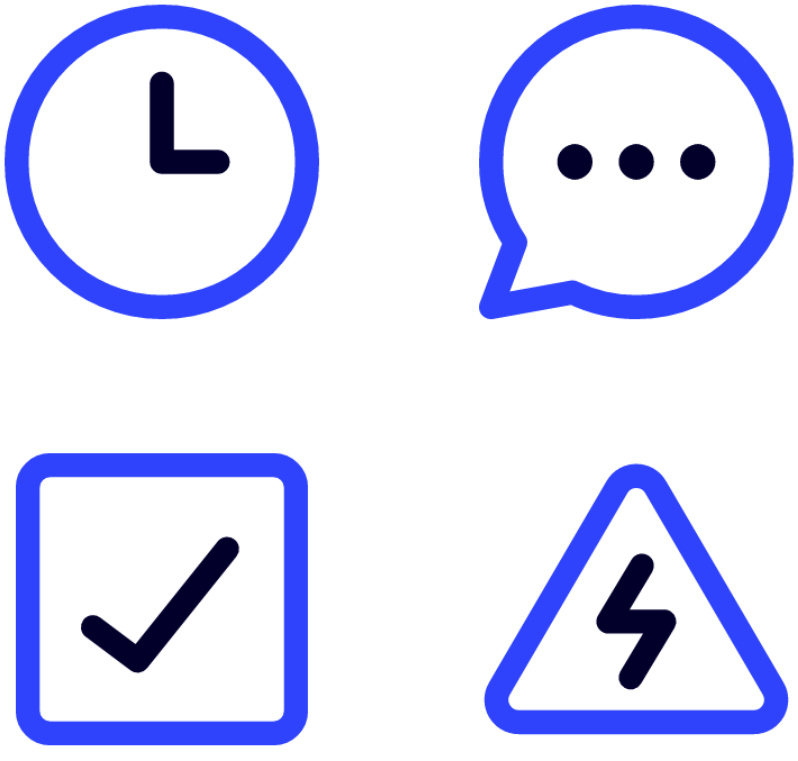How to Make Your Next Ideation Workshop a Success

5 principles to move from post-it chaos to strategic outcomes
Innovation leaders know the pressure: generate ideas that are not just creative, but relevant, feasible, and ready to move into testing. An ideation workshop is one of the most effective ways to turn insights into tangible concepts, align around the most promising solutions, and prepare them for validation.
A well-run ideation workshop bridges the gap between customer insight and concept testing. A poorly run one? Just another meeting with colourful sticky notes and no follow-up.
At Bluemorrow, we’ve facilitated and co-designed countless ideation workshops with corporate innovation teams across industries. While every session is different, the most successful ones consistently apply a few core principles. In this article, we share five practices that help make any ideation workshop truly impactful.
1. Start with the user insights
Strong ideas start with understanding the people you are designing for. Before running an ideation workshop, gather insights from users to uncover needs, pain points and aspirations.
For example, an unclear or vague challenge might be:
"Improve the app experience."
This lacks focus and leaves the team unsure of where to direct their efforts. A more effective challenge, grounded in real insights, would be:
"How might we help first-time users complete a task within 60 seconds without requiring sign-up?"
Starting your ideation workshop from real needs ensures the session focuses on creating solutions people will truly value.

2. Design for divergence and convergence
The best ideation workshops have a rhythm: explore widely, then focus sharply. Many workshops stop at idea generation, leaving participants inspired but leadership unsure of next steps.
We structure each ideation workshop using the diverge-converge model:
Diverge
Diverge
Use prompts, trends, and structured creativity techniques to explore as many ideas as possible; Quantity over quality.
Converge
Converge
Cluster, prioritize and select the ideas with the strongest mix of novelty, feasibility, and alignment with the challenge.
This ensures every ideation workshop ends with an aligned prioritization of ideas, ready for the next stage.
3. Use constraints to foster creativity
Contrary to popular belief, constraints don’t kill creativity; they enhance it. In an ideation workshop, clear constraints offer direction, foster focused thinking, and often lead to unexpectedly original ideas.We typically establish parameters such as target user groups, budget range, time frame or technology scope before starting the ideation workshop. Alternatively, you could also use creative constraint prompts to broaden perspectives:
- How would a child solve this?
- How would you solve it completely analogue?
- How would someone with a disability tackle this challenge?
These kinds of questions don’t just create new ideas. They push participants to set aside their usual assumptions and make it easier to transition from basic ideas to new perspectives on the problem.
4. Curate the right mix of people
Great ideas rarely come from echo chambers. The most productive ideation workshops bring together a mix of roles, experiences, and perspectives. That’s where the real sparks happen. Diverse voices help uncover blind spots, spark new connections, and build early ownership of ideas. Where possible, we even bring in customers or partners to co-create solutions directly.
To get the best results, brief participants before the ideation workshop or dedicate enough time at the start of the session so they can familiarize themselves with the challenge, key insights, and expected outcomes.

5. Facilitate for outcomes
Every ideation workshop benefits from a neutral facilitator. This person doesn’t generate content but focuses entirely on guiding the process. This separation helps participants stay engaged in the activity. Meanwhile, the facilitator makes sure there is structure, flow and attention on the outcomes.
Facilitation is not about controlling the conversation. It’s about creating the right environment for everyone to contribute and keeping the group focused on outcomes.
In an ideation workshop, effective facilitation means:

- A clear agenda and timeboxes to ensure outcomes are met
- Equal participation from all voices
- Adjusting pace and energy as needed
- Guiding the group toward concrete outputs
Bringing in an experienced facilitator ensures the team can fully participate without worrying about managing the process.
How ideation workshops support new business creation
At Bluemorrow, an ideation workshop is part of a broader innovation process that moves from opportunity to tested solutions:
-
Opportunity to concept
We start with identified opportunity areas based on trends, technology shifts, or customer insights. The ideation workshop is where these opportunities are translated into initial solution concepts. -
Validation framing
We define the hypotheses, success metrics, and low-fidelity prototypes needed to test the most promising concepts. -
Testing and iteration
Concepts from the ideation workshop move into structured experiments or customer tests, with learnings feeding into refinement or scaling decisions.
This process ensures that an ideation workshop is never just about generating ideas, but a crucial step in turning insights into validated solutions.
Let's make your next ideation workshop count
We’ve spent years designing and running brainstorming workshops across various industries, from rapid sprints to multi-day sessions, both in-person and online. No matter how we set it up, our goal remains the same: to help teams come up with ideas that lead to real business results.
Whether you're exploring a new product, tackling a strategic challenge, or shaping future growth areas, every ideation workshop we run is designed to turn insights into ideas worth testing and scaling.
Curious how your next workshop could spark real results? Connect with Lilian to start planning.



